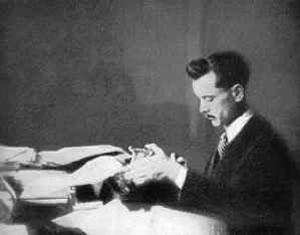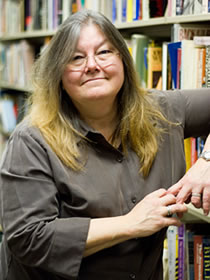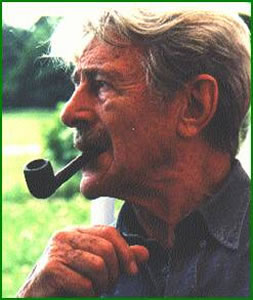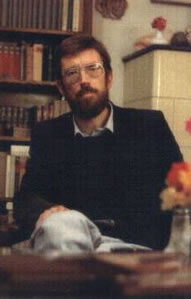|
De Hongaarse dichter Attila József werd geboren op 11 april 1905 in Boedapest. Zie ook mijn blog van 11 april 2007 en ook mijn blog van 11 april 2008 en ook mijn blog van 11 april 2009 en ook mijn blog van 11 april 2010.xml:namespace prefix = o ns = "urn:schemas-microsoft-com:office:office" />
There was a beauty
There was a beauty. There was sweetness.
I contemplated
a delicate rose.
And reality smashed down on me
like a loose boulder.
The boulder is just an image.
It'll be best to
tell everything.
The daily grind's edifying
and has the whip-hand.
My instinct followed the right track.
When that man came in
it boomed like breakers:
"I know him. Electricity.
He'll switch off the mains."
I was sharpening my pencil
the knife in my hand.
If I stab this man
I know that I shall be at peace,
at last reconciled.
I was embittered. Well, all right.
The whole flat will be
dark and depressing.
An animal can protect its home.
This war's different.
Violence will just be futile.
I'll get beaten up,
turn sick and twisted.
And no light. Where there's rule of law
cash is armament.
The technology of war's changed.
The splendid hero
needn't draw his sword.
Five pound notes are bomb explosions,
pennies are shrapnel.
That's the way I reasoned it out.
So I said: "Hallo"
and stepped aside.
At nightfall the generous moon
smiled at the outcome.
Vertaald door Nicolas Krasso en Lucien Rey.

Attila József (11 april 1905 3 december 1937)
De Amerikaanse schrijfster Dorothy Allison werd geboren op 11 april 1949 in Greenville, South Carolina. Zie ook mijn blog van 11 april 2010.
Uit: Three Things I Know for Sure
Let me tell you the mean story. For years and years, I convinced myself that I was unbreakable, an animal with an animal strength or something not human at all. Me, I told people, I take damage like a wall, a brick wall that never falls down, never feels anything, never flinches or remembers. I am one woman but I carry in my body all the stories I have ever been told, women I have known, women who have taken damage until they tell themselves they can feel no pain at all. Thats the mean story. Thats the lie I told myself for years, and not until I began to fashion stories on the page did I sort it all out, see where the lie ended and broken life remained. But that is not how I am supposed to tell it. Im only supposed to tell one story at a time, one story. Every writing course I ever heard of said the same thing. Take one story, follow it through, beginning, middle, end. I dont do that. I never do. Behind the story I tell is the one I dont. Behind the story you hear is the one I wish I could make you hear. Behind my carefully buttoned collar is my nakedness, the struggle to find clean clothes, food, meaning, and money. Behind sex is rage, behind anger is love, behind this moment is silence, years of silence.

Dorothy Allison (Greenville, 11 april 1949)
De Franse schrijver, essayist en uitgever Hubert Nyssen werd geboren Boendael aan de rand van Brussel op 11 april 1925. Zie ook mijn blog van 11 april 2010.
Uit: Le Miroir Invisible
La pièce de Serge Rondier, Le miroir invisible, était à l'affiche depuis près de trois mois et le moment approchait où l'on fêterait la centième. Chaque soir la cour qui est devant le petit théâtre de la rue Mouffetard bruissait comme l'entrée d'une ruche un jour dorage. On jouait à bureau fermé, et la salle était pleine dix minutes avant le lever de rideau. Or il ny avait pas de rideau. Sitôt installés, les gens pouvaient apercevoir sur la scène un corps de femme affalé dans lobscurité. Ils en avaient eu vent et sils se pressaient ainsi cétait sans doute pour se donner le temps de scruter ce corps, juger de son immobilité comme si cétait une performance et surtout ne pas manquer son réveil quand, les lumières séteignant dans la salle, la rampe éclairerait lentement la scène.
Le succès du Miroir invisible, ni Serge Rondier, ni Georges Malassis, le directeur du théâtre qui était aussi le metteur en scène, ni Solange Vattier, l'unique interprète, ne s'y étaient attendus car la critique avait rendu compte de la pièce avec une certaine lâcheté. À voir, à la rigueur... Mais les spectateurs étaient venus, plus nombreux chaque soir. Sans doute une manifestation du phénomène le moins contrôlable dans l'ordinaire du spectacle, disait Malassis, la rumeur. Et que faisait-elle danser sur ses vagues, la rumeur ? Que s'il fallait voir Le miroir invisible et se laisser envahir par ce monologue tout d'un bloc, quatre-vingt-dix minutes de paroles, à peine aérées ici et là par de petits silences, c'était afin de jouer avec l'idée perfide quà la condition de renvoyer le passé dans l'avenir on peut reprendre à la fatalité ce quelle vous a dérobé.

Hubert Nyssen (Boendael, 11 april 1925)
De Duitse dichter Rolf Schilling werd geboren in Nordhausen in de Harz op 11 april 1950. Zie ook mijn blog van 11 april 2007 en ook mijn blog van 11 april 2009 en ook mijn blog van 11 april 2010.
Mai-Segen
I
An Segen reich, von Flieder-Duft umflossen,
Stehn wir am Wall, wo sich zu jähem Streich
Der Lenz erhebt mit funkelnden Geschossen,
An Segen reich.
Die Sonne steigt, die die Natter träumt am Teich,
Gefilde grünen, Halm und Knospe sprossen,
Ein sanfter Regen macht die Äcker weich.
Verschwistert blühn im Glanz, der sich ergossen,
Die Rose blutend und die Lilie bleich,
Von eines Gartens goldnem Ring umschlossen,
An Segen reich.
II
Wenn Segen fließt, so frag nicht, wer ihn spende
Und wann der Himmel seine Pforten schließt,
Und spiel das Spiel, als ob sich alles wende,
Wenn Segen fließt.
Nicht war dir Winters Hermelin erkiest,
So weck den Lanz im blühenden Gelände
Und sei dem Hüter, der das Licht genießt,
Gespiel und leg dein Herz in seine Hände
Zier deine Haut mit Zeichen, die er liest,
Und folg dem Traum, als ob er nimmer ende,
Wenn Segen fließt.
III
Gesagnet sei der Efeu an der Mauer,
Das Blatt des Ahorns und der Schwalbe Schrei,
Und hoffe du, daß auch des Herbstes Schauer
Gesegnet sei.
Nimm hin das Licht, und dem Oktober leih
Von deinem Gold, wehn auch die Lüfte rauher,
In deinem Herzen ist noch immer Mai.
Und frage nicht, ob dieser Traum von Dauer
Und ob der Winter dir ein Zeichen weih,
Und sorge du, daß auch der Tag der Trauer
Gesegnet sei.

Rolf Schilling (Nordhausen, 11 april 1950)
|



